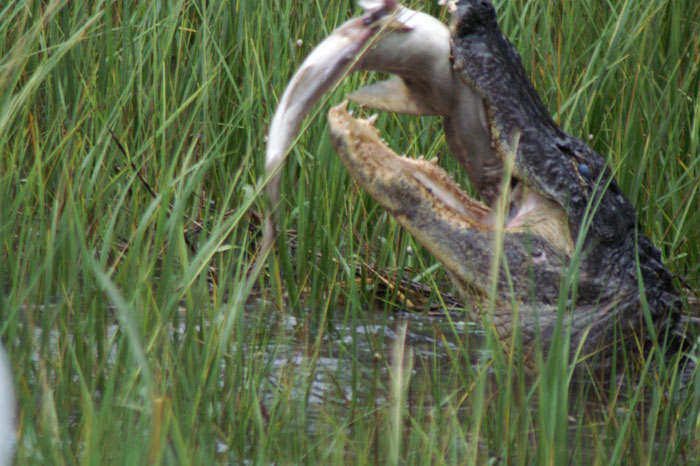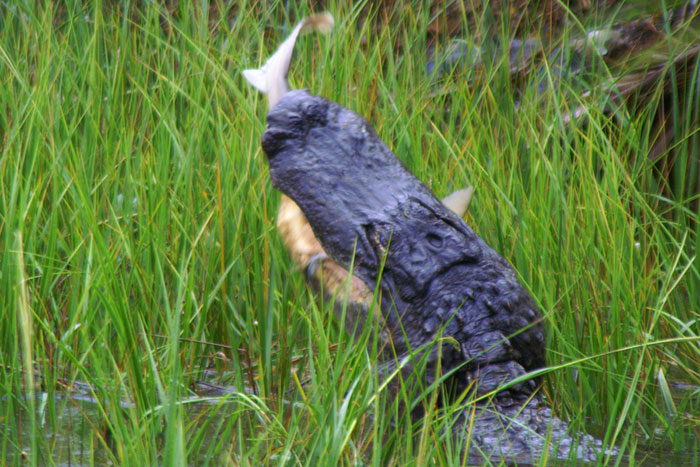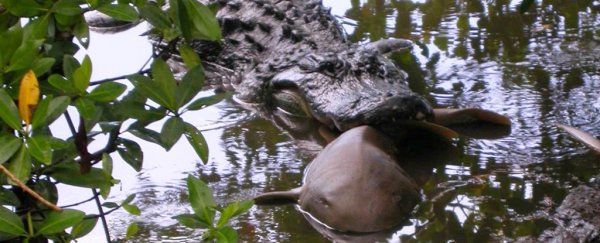For the first time, researchers have documented the violent clash of predators from two very different worlds, discovering evidence of alligators feasting on sharks in the wild.
While there have been anecdotal reports of this kind of thing happening before, it's never been comprehensively studied, since ordinarily the American alligator (Alligator mississippiensis) and sharks occupy very different bodies of water.
But that's not always the case. In coastal areas where marine ecosystems meet with estuaries, sometimes sharks and stingrays will veer from their ocean habitat into the briny mix of fresh and saltwater near the shore.
Evidently, it's not always a good idea to do this, because it can bring them into contact with a fearsome predator that can adapt to the salty conditions of these coastal waterways.
 Judy Cooke
Judy Cooke
"Alligators seek out fresh water in high-salinity environments," says ecologist James Nifong from Kansas State University.
"When it rains really hard, they can actually sip fresh water off the surface of the saltwater. That can prolong the time they can stay in a saltwater environment."
For their research, Nifong and wildlife biologist Russell Lowers searched through scientific and historical literature and consulted experts for any accounts of alligators attacking elasmobranchii – a subclass of cartilaginous fish that includes sharks and rays.
They found unreported evidence of four times where American alligators preyed on elasmobranchii, including attacks on a nurse shark (image at top), bonnethead shark (image above and below), lemon shark, and an Atlantic stingray.
There might not be any great whites on that list, but it shows A. mississippiensis is happy to forage beyond its regular diet of crustaceans, snails, and fish when seafood specials feature on the menu.
 Judy Cooke
Judy Cooke
"Alligators are opportunistic," Nifong explained to New Scientist. "They're not going to pass up a big chunk of protein that's swimming by."
While the known instances of this preying are few and far between, the researchers say the fact it happens at all means sharks and rays may constitute a more significant part of the alligator diet than scientists had previously realised.
It's also food for thought when it comes to managing endangered marine animals – as one of the uncontemplated risks to their survival could be death by alligator.
As for why this preying behaviour has gone mostly unnoticed for so long, it could be because both alligators and sharks are difficult animals to study and observe in coastal habitats – especially since some small sharks can be mistaken for fish.
There's also the question of post-meal evidence – or the lack of it – when researchers pump alligator guts to analyse what they've been consuming.
"Most prey gators eat turn to mush pretty quickly within their stomachs," ecologist Adam Rosenblatt from the University of North Florida, who wasn't involved with the study, told National Geographic.
"It all turns into one big pile of indistinguishable stuff, except for certain body parts like hair and shells."
But just in case you thought this was a one-way contest, guess again. In the course of their research, Nifong and Lowers also uncovered reports of a bizarre historical melee, when the tables were turned on alligators.
"[O]n 5 October 1877 the sports magazine The Fishing Gazette published an article entitled 'Alligator and Shark Fight', recounting the observations of an epic skirmish between American alligators and sharks (unknown species) in a tidal inlet near Jupiter, Florida," the authors write in their paper.
According to The Fishing Gazette, after some 500 alligators congregated in the inlet to feast on a school of fish brought in by the tide, hundreds of sharks responding to the bloodbath zeroed in for an alligator ambush.
Per one eyewitness account: "[The] sharks and alligators rise on the crest of the waves and fight like dogs."
Epic.
The findings are reported in Southeastern Naturalist.
